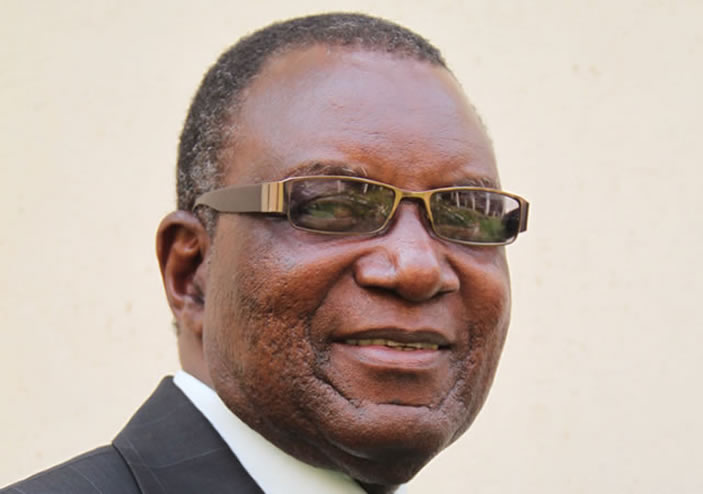
The Sunday News

Dumisani Nsingo Acting Business Editor —
TRANSPORT and Infrastructural Development Minister Dr Joram Gumbo has extended an olive branch to the National Railways of Zimbabwe (NRZ) board and management to prove their mettle in turning around the fortunes of the parastatal. In a telephone interview with Sunday Business recently, Dr Gumbo said he was not going to make a rushed decision to appoint a new general manager and board chairperson for NRZ but would give the interim executive time to prove their capabilities of turning around the struggling entity.
NRZ has been without a substantive general manager since the death of Retired Air Commodore Mike Karakadzai in August 2013. Engineer Lewis Mukwada has been running the NRZ since Rtd Air Comm Karakadzai’s death. Engineer Alvord Mabena was relieved of his duties as board chairperson early last month and his former board vice-chairperson Brigadier-General David Chiweza is the acting chairperson.
“At this point we don’t want to disturb a floating boat. We will definitely need a general manager because at the moment the one who is there is acting. At the moment the structure is not what it should be. We will need a board and management which are well focused and don’t have any discord.
“We want to see how those who are there are working and eventually I will appoint someone as board chairman and if there is a need to fill the gap of another board member we will definitely do that. So let me take time and see if those who are there can deliver and if they don’t the whole ship will go,” Dr Gumbo said.
For more than a decade, NRZ has been underperforming owing to a number of challenges that the economy has been going through in recent years. Under-capitalisation, antiquated equipment, and a skills flight among others have crippled operations at the state-owned rail firm.
NRZ is in dire need of fleet renewal, with most wagons more than 40 years old and having gone beyond their lifespan. The parastatal moved 3,6 million tonnes of goods in 2013, against a target of six million. In 1998, the NRZ moved 18 million tonnes of goods. A funding proposal prepared by Eng Mukwada last year showed that the company was seeking an excess of $2 billion to fully recapitalise.
Dr Gumbo said board members of State enterprises should refrain from allying themselves with Ministers of their line ministries but thrive on executing their duties diligently so as to improve operations at their entities.
“I want to issue a warning to board members of all Government enterprises, not only those under my ministry, to desist from having alliances with Ministers but to commit themselves to the institutions, which they run, not any individual. I will only work with people who have interest and those who direct the mandate of the institution which they run,” he said.
Dr Gumbo recently relieved CMED (Private) Ltd board chairman Mr Godwills Masimirembwa of his duties as part of efforts to “clean the mess” at the parastatal.
In a letter dated 18 December, Dr Gumbo said he had seen it fit to change the leadership of CMED to allow the realisation of his strategic goals of parastatals under his ministry. “In this regard, this serves to inform you that you have been relieved of your position as the chairman of CMED (Private) Ltd with immediate effect,” Dr Gumbo wrote.
“You are instructed to immediately return all documents, material and property belonging to CMED currently under your possession, and at any rate, not later than 4pm on Monday 21 December 2015,” read part of the letter.
In another development Dr Gumbo said work at the estimated $3,4 million dry port at Walvis Bay in Namibia was at an advanced stage. In 2009 the government of Namibia granted Zimbabwe 19 000 square metres of land in the port city of Walvis Bay to construct the dry port as part of efforts by the two countries to facilitate an efficient transportation of goods.
“We are about 70 to 80 percent in terms of completing the project. The delay has been largely due to lack of funding. Sometime in October a team from the ministry went there to access the situation and reported that it was satisfied with the progress taking place and all this being equal work at the site will be completed by March next year or even earlier than that,” Dr Gumbo said.
Namibia has become one of the most strategic routes for landlocked countries to access the seas. Trade for Zimbabwe through the port of Walvis Bay has grown significantly to 2 500 tonnes of cargo per month, according to Government. The port has seen tremendous growth over the years. In 1994 it was mainly a fishing port handling about 20 000 containers per annum. This figure has grown to about 350 000 containers per annum and is expected to reach one million containers per annum with the expansion projects under way.
“Zimbabwe is a landlocked or inland country and we incur high storage charges at the ports for storing our shipped goods most of which are commercial goods that are sometimes cleared late…thus having our own port will result in minimum storage charges. We are therefore grateful to the Namibian government for their benevolence,” Dr Gumbo said.
Several studies have pointed out that some of the problems facing Zimbabwe’s foreign traders include lack of infrastructure to facilitate the efficient shipment of imports and exports. The Government has been taking steps to solve the bottlenecks. A dry port (inland port) is an inland intermodal terminal directly connected by road or rail to a seaport and operating as a centre for the transhipment of sea cargo to inland destinations.



